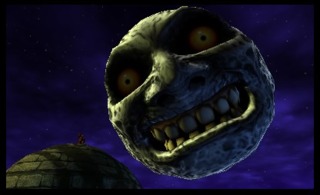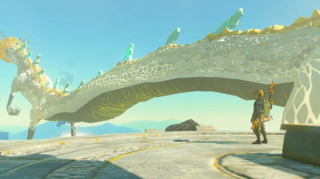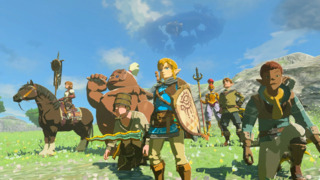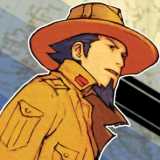Back to the Beginning: Thoughts on Tears of the Kingdom's Narrative
By majormitch 0 Comments
SPOILER WARNING: This blog contains major story spoilers for The Legends of Zelda: Tears of the Kingdom. It also contains brief spoilers for multiple other Zelda games, including Ocarina of Time, The Wind Waker, Twilight Princess, Skyward Sword, and Breath of the Wild.
What does it take to topple a great evil? Especially an evil that has established a seemingly overwhelming power over those around it? What kind of struggle might any potential hero endure, what sacrifices might they need to suffer for good to prevail? And what lasting impact might such a grand conflict have on the world in which it occurs? These are important questions that many stories about good vs. evil ask. The Legend of Zelda: Tears of the Kingdom, by contrast, asks no such questions. This is a story about good triumphing over evil in full, with Hyrule and its heroes ending right back where they started: order is swiftly and cleanly re-established. As the credits rolled, I couldn’t help but wish this story I had just spent over 100 hours had something more interesting to say.

To be fair, The Legend of Zelda games are not exactly known for having the most intricate stories ever told, among video games or otherwise. We usually know the basic framework ahead of time, because it is largely the same: an evil power (Ganon) rises up, and a courageous hero (Link) will rise to defeat this evil, guided by the wisdom of the princess (Zelda). In Zelda lore, it’s a cycle that is destined to repeat across time forever, with the spirit of those three major players being reincarnated into new heroes and villains every so many hundred or thousand years. It’s just how it is. So on the one hand, maybe I shouldn’t expect more from Tears of the Kingdom; this is just the Zelda template playing out once more, after all. But only expecting the same good vs. evil fantasy tale with nothing else interesting to say would be selling short what this series itself has frequently done before. Many past Zelda games have fleshed out this otherwise basic framework with nuanced details and interesting themes. Majora’s Mask is full of compelling characters making peace with their lives in the run-up to a world ending event. A Link to the Past and A Link Between Worlds contrast light and dark versions of a world and its characters, and ask if and how they might co-exist. Ocarina of Time and Breath of the Wild portray people living under Ganon’s rule for an extended period, and what they do to survive and cope.
More than anything, most previous Zelda games come with a sense of struggle and loss; great evil cannot be defeated without loss, and our heroes and their kingdom are left shaped by that struggle. In Ocarina of Time, as Link returns to the timeline of his youth, there’s a bittersweet realization that his childhood can never be truly recovered. In The Wind Waker, after a somber monologue from Ganon before his death, Tetra/Zelda and Link accept that they must leave Hyrule and the past behind, and search for a new land and a new Hyrule. In Twilight Princess, Midna elects to sever the connection between the two realms, sealing herself away from her new friends to maintain peace. In Skyward Sword, despite his defeat, Demise afflicts Zelda and Link with the very curse that creates this entire cycle. In Breath of the Wild, Zelda and Link initially fail completely, and only after 100 years of irreversible suffering throughout Hyrule do they complete their redemptive arc. In each of these stories, we see and feel the effect that this iteration of the conflict has had on the current set of heroes and their kingdom. Even when good eventually triumphs, evil leaves a mark that can never be fully erased or forgotten.

By contrast, the ending in Tears of the Kingdom shows neither growth nor sacrifice from its heroes, and no lasting mark in the wake of its central conflict. The game’s final words consist of Zelda and her new sages vowing to protect Hyrule, which is nothing more than a rote reiteration of the status quo. Furthermore, and to me the most damning aspect of Tears of the Kingdom’s narrative, is that all the sacrifices made and losses suffered during the game’s climactic moments (which were extremely well-produced scenes on their own) are erased with the mere wave of a hand. In the game’s most pivotal moment, Zelda decides to become a dragon as a means to restore and transport the Master Sword back to the future. This should be a profound sacrifice, as she loses her mind and her body in the process. There is an alternate version of Tears of the Kingdom where Zelda never reverts from this state, where she remains a dragon for the rest of her life, patrolling the skies as a reminder of the great conflict that took place here. I mourn for this version of the story that did not come to pass; it would have been the braver and more honest version of good triumphing over evil. Instead, Zelda is “cured” of being a dragon with nary a (satisfying) explanation. In the same stroke, Link’s arm that was gravely injured at the beginning of the game is also restored. Even an injured arm is a bigger cost than Tears of the Kingdom is willing to pay. It’s a comprehensively triumphant victory for our heroes, a story with no bite.
In these final moments, Tears of the Kingdom’s central message is clear: this is a tale about maintaining the status quo, about ending right back where we began. This (cartoonishly one-dimensional) iteration of Ganon is defeated just as quickly as he arrived, the “regional phenomenon” that were initially presented as great threats turn out to be mild nuisances for our hero, and everyone is able to return to their lives after Link does his thing. The only real lasting change comes from the geological shifts around Hyrule, its new floating islands and underworld depths: these are treated as archaeological curiosities from Hyrule’s academics and explorers, rather than a symbol of the conflict that took place. I can imagine history’s retelling of this period of Hyrule: “A bunch of rocks floated into the sky, we studied some ancient artifacts and cleaned up the associated mess, then moved on.” To the average citizen, Ganon’s presence in this event is barely noticeable other than an increased monster presence, and there is no lasting consequence from his brief resurrection. Tears of the Kingdom plays out like a “mystery of the week” side diversion, where even its one legitimately cool twist – Zelda turns into a friggin’ dragon! – is undone by the end. And arguably, the only central characters who show much development are newly introduced ones who have been dead thousands of years already, and are mostly seen through flashbacks: we see Rauru, Sonia, and Mineru grow and make great sacrifices, while Zelda and Link end up frustratingly stagnant.

Before Tears of the Kingdom came out, I was excited to see what it would do with a return to the same world we explored in Breath of the Wild. It’s the first time in the series’ history that we see a direct sequel revisit the exact same landmass, with the exact same people. There was an opportunity to create real continuity, and to explore questions Zelda games have never had the chance to explore. How do the inhabitants of Hyrule rebuild after the catastrophic events of Breath of the Wild? How will new societies and cultures be formed? What potential new challenges could arise? How will our heroes, Zelda and Link, adapt to their new roles in a post-Ganon world? (Well, until he comes back, of course.) We get small glimpses of these aspects around the periphery, and these are my favorite story moments of Tears of the Kingdom. One such example is the formation of Lookout Landing and the monster hunting militia that takes upon itself to fight off monsters. Stories like these – of people banding together to build new communities and care for each – other are wonderful bits of worldbuilding, and show how far the citizens of Hyrule have come since the dark days of the calamity. Yet they are few and far between. When it comes to the central A Plot, Breath of the Wild is largely forgotten in favor of making Tears of the Kingdom a standalone game with short-term memory. In the opening moments, a new Ganon emerges, your excess hearts and stamina are drained, you complete another tutorial zone to gain four more powers, and are instructed to visit the same four regions from Breath of the Wild. It’s a complete reset, uninterested in building on existing material from its direct predecessor in favor of repeating the same beats, and by the end we still end up right back where we started. That may be par for the course for the series, but as a direct sequel, Tears of the Kingdom had an opening to do something more.
There are many other points I could hit, but in the interest of keeping this essay a reasonable length and somewhat focused, I want to finish with one last instructive example. Like many, one of my favorite side quests in Breath of the Wild was the quest to build Tarrey Town. It was a poignant instance of diverse people working together to build a future for themselves, within a long-ruined world that promised no future for anyone. They showed great determination in taking control of their fate to develop something new and inspiring. Tears of the Kingdom attempts to replicate that same fan favorite questline via the Lurelin Village Restoration Project side quest, but rather than be a story about a community growing and building something new, it’s a story about reclaiming something they used to have. Just as Zelda, Link, and Hyrule at large seek to return to the status quo, so does Lurelin Village. Similar parallels could be made for the four regional phenomena as well, where the denizens of each region seek to restore the previous order. With rare exception, all roads in Tears of the Kingdom lead back to the beginning. And while that can be seen as a noble and worthy plight in the case of the individual actors, the overall narrative remains uninspired.
Tears of the Kingdom is a wonderful game that I had a lot of fun playing for over 100 hours. It’s a masterfully constructed sandbox that gives you all sorts of fun tools to play with; a Zelda game for the Minecraft generation. And for the most part, that’s all it needs to be, and should be celebrated for its smart mechanics and design. It will likely end up as one of my favorite games of the year. Yet I can’t help but be disappointed that it didn’t attempt to do more with its narrative, rather than less, compared to past Zelda games. Link defeats a new Ganon, and saves both the princess and the kingdom yet again, paying no price in the process. Hyrule and our heroes end up right back where they started; in the wake of what should have been a massive conflict, it’s as if it never happened in the first place.
Thanks for reading. If you enjoyed this essay, I stumbled across other essays on this topic as I was in the middle of my own writing. Give these articles a read if you're so inclined; their authors are better writers than me anyway!
'Her Only Weapons Were Her Tears' by Harper Jay
'Tears of the Kingdom's ending is its own kind of tragedy' by Jay Castello
